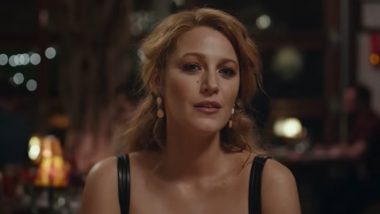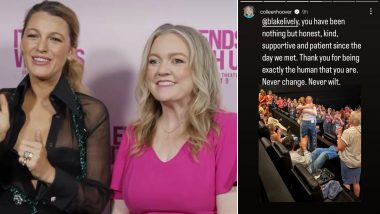Since the news of Colleen Hoover’s It Ends With Us book being turned into a movie hit the news, I have been stressed about the outcome. For the uninitiated, It Ends With Us deals with abusive relationships and how different survivors react to the situation. However, the book was heavily popularised as a “romance novel” and has been criticised. While the author of It Ends With Us - Colleen Hoover - has been heavily criticised for a lot of her work, It Ends With Us was treated with more sensitivity by fans and critics alike - as the book revolved around Colleen Hoover’s mother’s story with an abusive partner and how she evolved from it. I walked into It Ends With Us the movie, starring Blake Lively, Justin Baldoni and Brandon Sklenar, with all the knowledge of its plot, and its triggers and with a determination to once again give this story the grace I can. However, in the end, the movie, much like the book, had a lot of issues that made me question if this movie needed to be made.
Identifying Abuse
One of the biggest things that people across the world struggle with - is understanding abuse. Unless it is explicitly shown to us, most people fail to understand abuse, its reactions. It Ends With Us actually gives us some examples of identifying abuse and giving grace to reactionary abuse - something the world needed a reminder of. When the first instance of physical abuse is shown, it is sudden, casual and brushed over. However, an important thing to remember - after Ryle hits Lily, and tries to approach her again, Lilly pushes him away. This push leads to Ryle cutting his hand. It is the simplest form of reactionary abuse and it is not on Lily.
The Love Bombing
The biggest reason that people have a hard time getting out of an abusive situation is the love bombing that often accompanies abuse. Both the book and the movie do a very good job of showcasing Ryle in his love-bombing phase. While the book makes us fall head over heels, in love with Ryle - just like Lily; Justin Baldoni as Ryle manages to subtly hint at the simmering anger and the threat of an abusive partner in a lot of scenes (When they speak about Ryle’s dead brother - Emerson).
Abuse As Suspense
One of the biggest issues with movies that grapple with abuse or assault occurs when the filmmakers try to showcase this abuse as the “plot twist”. It Ends With Us continues with this approach as well. The second scene of abuse is showcased to us from Lily’s point of view - which can convince the uninitiated audience that Lily did slip and fall. (She was pushed by Ryle). And while it adds to the “shock factor” in the most brutal scene of abuse - when Lily remembers everything, it is extremely problematic. A lot of filmmakers have shown that we can showcase the depth of the pain an abuse can leave, without sensationalizing it. It Ends With Us fails in that, once again.
The Depiction of Abuse
One thing that It Ends With Us will get credit for - from me - is the way it showcased the abuse. While a lot of people try and picturised it in a way that satiates the male gaze, rather that traumatise it - Justin Baldoni has worked hard to only bring out the worst in that scene. It is grim, powerful and will absolutely leave you gut-wrenched. The choice of showing considerably less gory but strong imagery to showcase the extent of the abuse, while Ryle says “Let me show you how much I love you” was spine-chilling and captures just how up abuse can be.
Overall, It Ends With Us - the movie - dealt with the abuse and relationship aspects of the story of Ryle and Lily with much more nuance than the book. While less than 60 minutes of the movie actually grappled with the abuse, it did so without glorifying Ryle of giving him any saving grace. However, at the end of the day, It Ends With Us left me with one question - did we need a movie for an imperfect book that has too many problems that cannot all be fixed? And the answer is - It should have ended with the book, but since it did not. I hope it ends with this.
Women and Child Helpline Numbers:
Childline India – 1098; Women’s Helpline – 181; National Commission for Women Helpline – 112; National Commission for Women Helpline Against Violence – 7827170170; Police Women / Senior Citizen Helpline – 1091/ 1291; Missing Child and Women – 1094.
(The above story first appeared on LatestLY on Aug 09, 2024 05:58 PM IST. For more news and updates on politics, world, sports, entertainment and lifestyle, log on to our website latestly.com).













 Quickly
Quickly




















